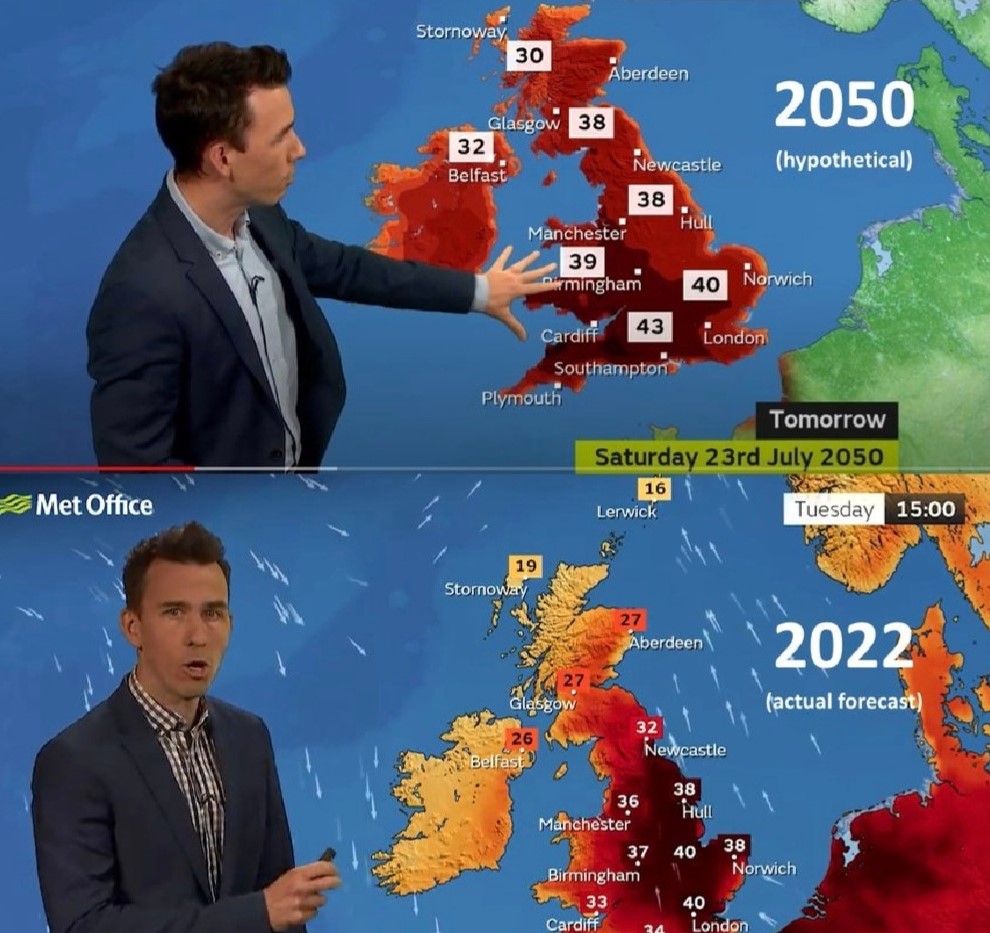By John Pickard
The US news agency, CNN reported in an article yesterday on a hypothetical weather forecast produced by the UK Met Office, for 2050. It shows record high temperatures across the British Isles. The trouble is, the ‘imaginary’ weather maps for 2050 look disturbingly like the weather maps we are seeing for the UK in the next few days, twenty-eight years too early.
Two years ago, CNN reports, Met Office meteorologists “dove in to the super long-range climate models in the summer of 2020 to see what kind of temperatures they’d be forecasting in about three decades”.
“We hoped we wouldn’t get to this situation,” the Met Office’s climate attribution scientist Nikos Christidis, told CNN. “Climate change has already influenced the likelihood of temperature extremes in the UK. The chances of seeing 40°C days in the UK could be as much as 10 times more likely in the current climate than under a natural climate unaffected by human influence.”
So a national emergency has been declared, not for thirty years’ time, but for the next few days, given the expected high temperatures. We have a ‘red’ warning for the first time ever. The British record high temperature of 38.7oC is expected to be broken by Tuesday.
There is no government at present
All kinds of advice is being offered for those thought to be the most vulnerable to the high temperatures. The trouble with government advice at the moment is that there is no government. There will be hundreds of avoidable deaths due to the NHS and its staff being run into the ground over the years.
Even before the national emergency from the weather, hospital accident and emergency departments are already unable to cope with the ‘normal’ traffic. All over the country there are reports of ambulances waiting outside A&E departments waiting to discharge patients for whom there are no beds or where the emergency department is just overwhelmed. Paramedics relate stories of spending almost their entire shift on a single case, sitting outside an A&E department. These are ambulances and paramedics that ought to be available for emergencies elsewhere. Will there be a massive investment in the NHS and ambulance services? Not a chance.
Last winter, the Guardian reported, there were a record number of ambulances waiting. According to NHS England data, a total of 151,798 patients were delayed for at least half an hour with their ambulance crews, because emergency departments were too busy to admit them.
Tory candidates called for dropping zero-carbon commitment
It is not possible to say who the new Tory Party leader, and therefore Prime Minister, will be, but we can be sure that there will be no nothing put in place to make up for the cuts in the NHS over the past decade or to prevent the ongoing looting of the NHS by private profiteers. Incredibly, some of the leadership candidates were in favour of completely ditching the UK’s commitment to zero-carbon by 2050, which leaves people wondering what planet these MPs think they are on.

It is unlikely now that we can prevent weather patterns changing as a result of the changing global climate. But what governments ought to be able to do is to anticipate ‘abnormal’ weather patterns and put in place plans and measures to mitigate the worst effect.
The extraordinary high temperatures are not just affected the UK, of course. Elsewhere in Europe there have been record highs in Spain, Portugal, Italy and even in the arctic regions of Norway. Deadly wildfires are sweeping through parts of Spain, Greece and Southern France. The website of the Fire Weather and Avalanche Center of the US lists literally hundreds of current wildfires, some tiny but some enormous. All of these ‘disasters’ will cost money and lost production and wealth and will ultimately add to social and economic decay.
Even some pessimistic forecasts underestimate rapidity of change
Whilst it was once thought that the immediate weather effects of climate change were something for the far future, it is increasingly clear that even some of the most pessimistic forecasts have under-estimated the speed at which ‘abnormal’ weather patterns can develop. It is an argument, not for putting ‘normal’ politics aside, but for doubling and trebling the fight for a different society.
If the enormous resources, skills, knowledge and potential of science and technology were put to use in the right way, then the worst effects of climate change could at least be mitigated and society could adapt in such a way to live with new and potentially damaging weather patterns.
But that would have to mean as a minimum that the spending of trillions on armaments (and research and development for newer weapons) would need to end. It would mean an economic system based on public ownership, democratic planning and the investment of resources for the benefit of all and not a vanishingly tiny proportion of the population.
It has to mean and end to a system based on short-term profit and greed. The big private corporations have had their day. They have trashed the planet and it is time to confiscate their assets and resources and point them in a different direction.



